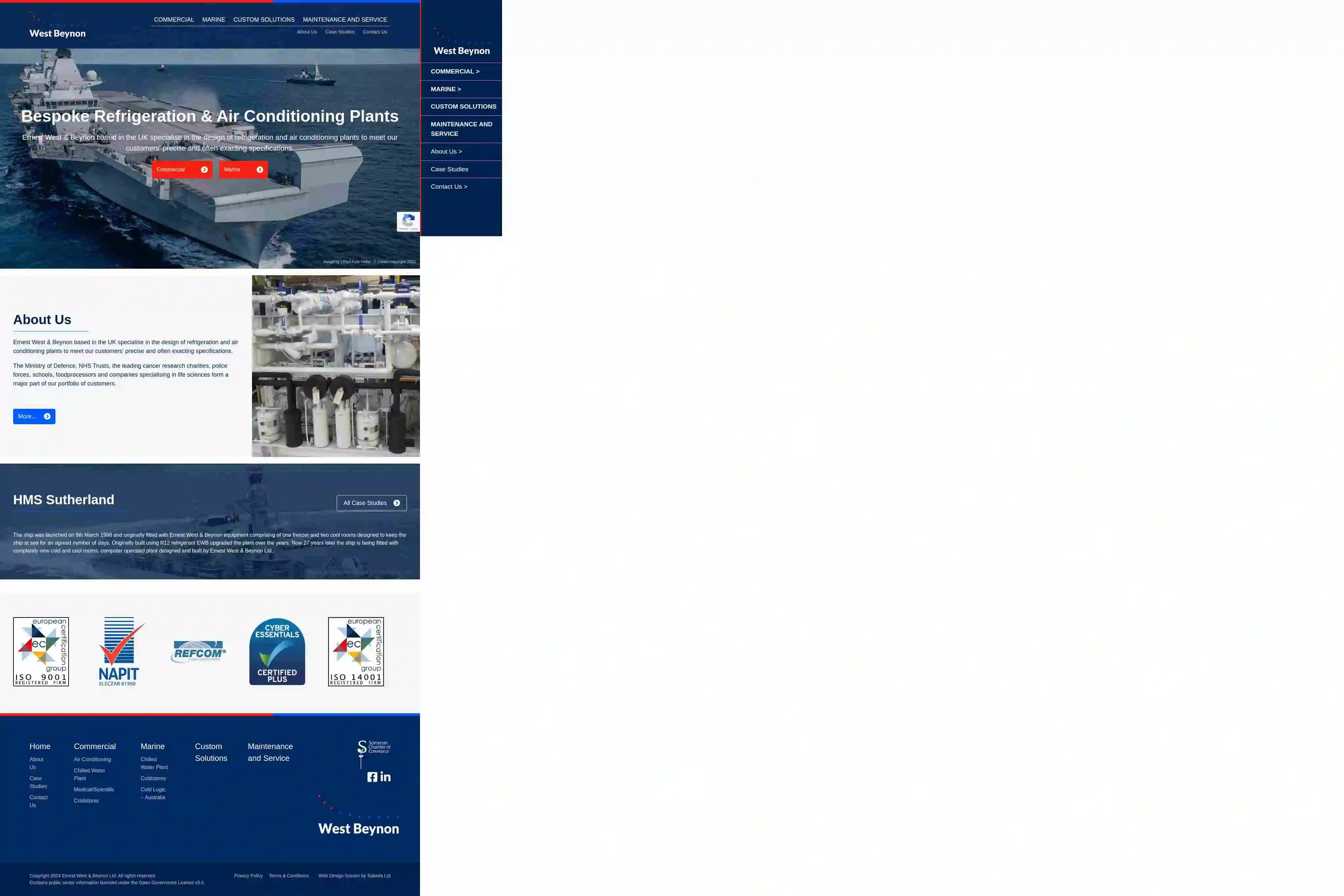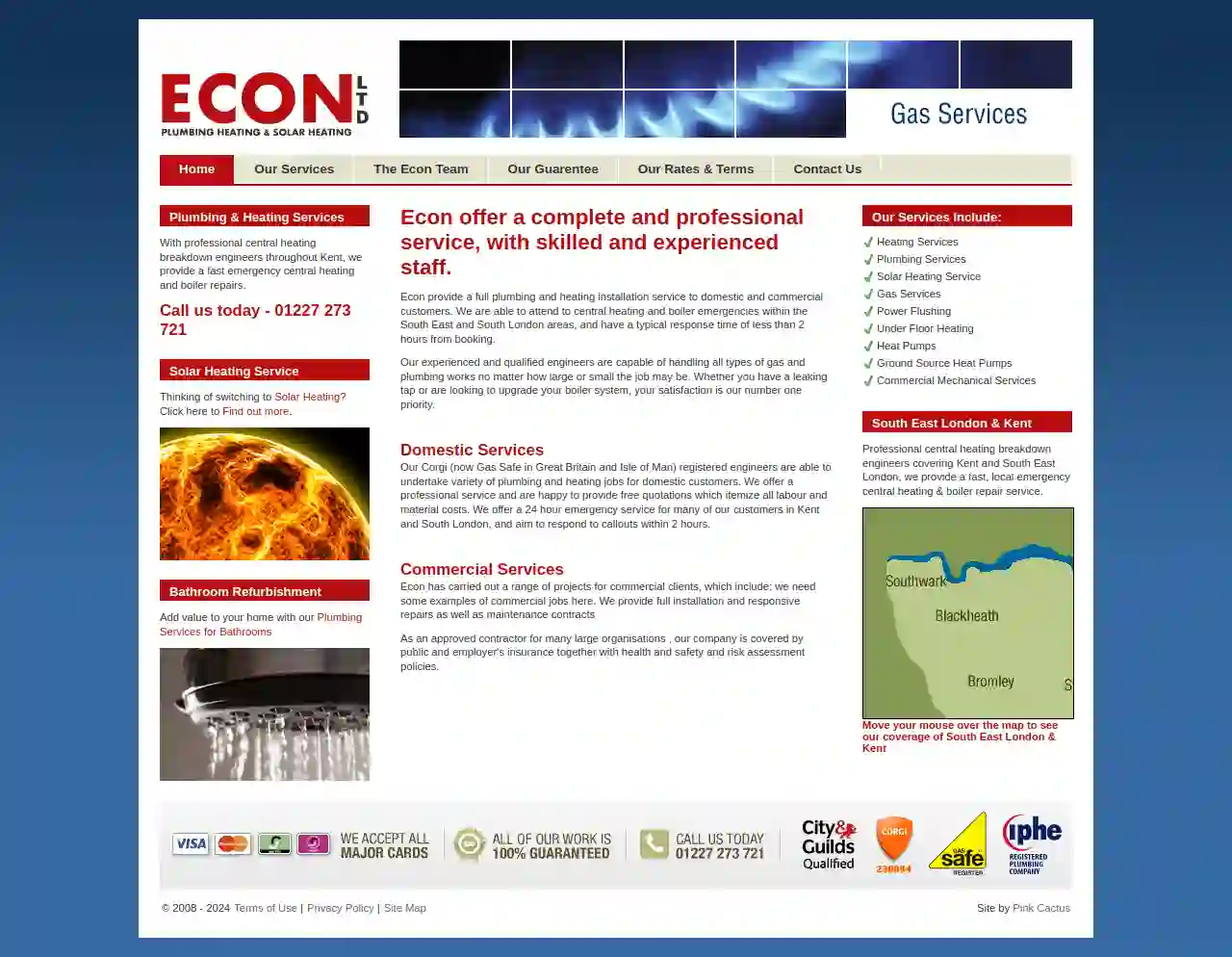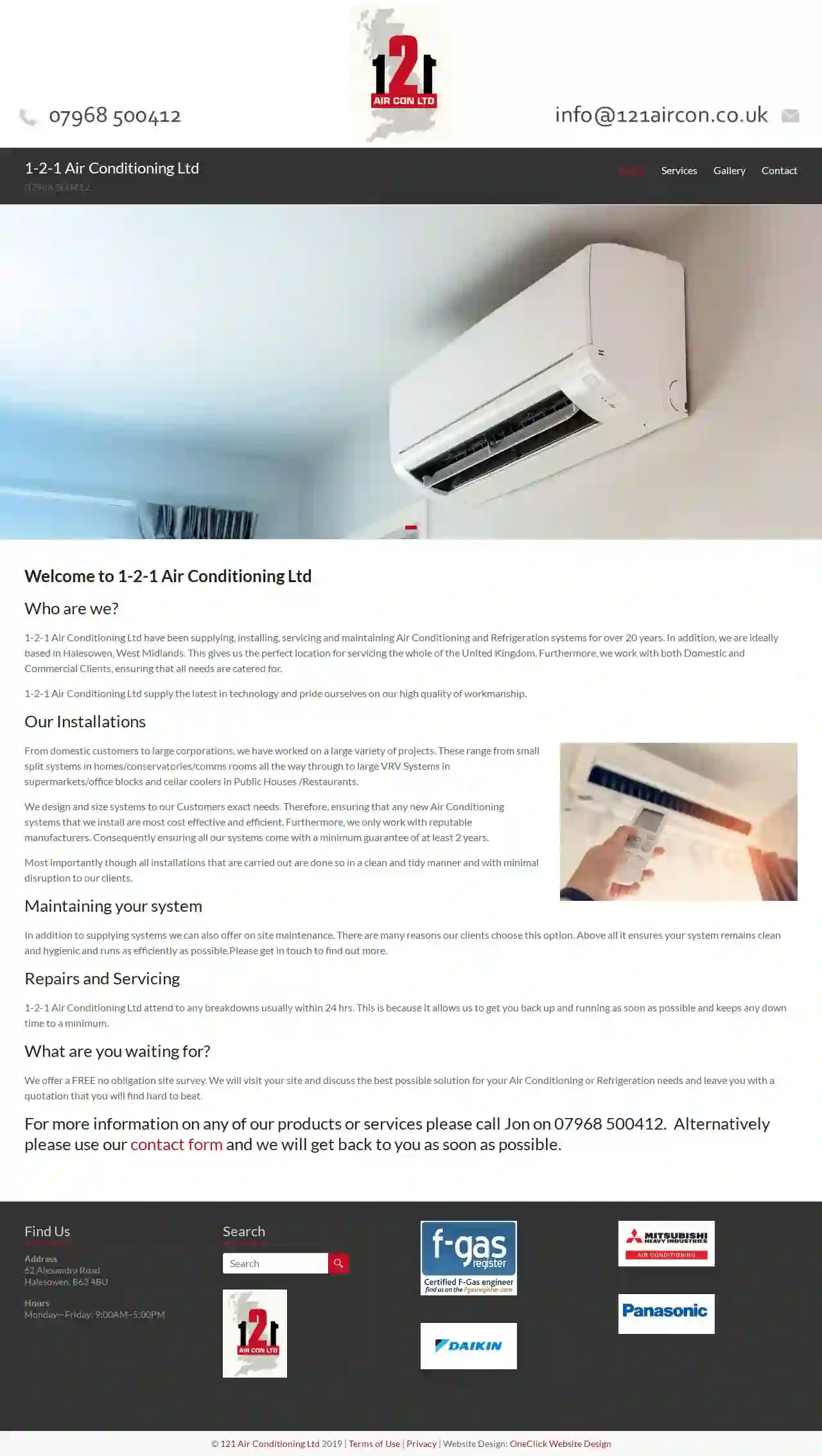Emergency HVAC Otford
Find the best 24/7 HVAC Repair in Otford
Get up to 3 Emergency HVAC quotes for your project today! Compare profiles, reviews, accreditations, portfolio, etc... and choose the best service.

AMD Environmental - M&E, Refurbishment, Facilities Management, Net Zero Consulting
4.510 reviewsJupiter House, Orbital One, Green Street Green Road, Dartford, DA1 1QG, GBAMD Environmental is a Mechanical and Electrical Design and Build Engineering specialist with a collaborative and sustainable approach in delivering challenging and bespoke projects across several industry sectors. We specialise in ‘Green’ sustainable technologies delivering energy efficient, low carbon solutions across the industry which is further supported by our Energy Lifecycle Modelling expertise.
- Services
- Why Us?
- Accreditations
- Our Team
- Gallery
Get Quote
Ernest West & Beynon Ltd
Tonbridge, GBErnest West & Beynon based in the UK specialise in the design of refrigeration and air conditioning plants to meet our customers' precise and often exacting specifications. The Ministry of Defence, NHS Trusts, the leading cancer research charities, police forces, schools, foodprocessors and companies specialising in life sciences form a major part of our portfolio of customers.
- Services
- Why Us?
- Gallery
Get Quote
Econ Ltd. Plumbing
Seasalter, Whitstable, Kent, 16a Preston Parade, CT5 4AA, GBEcon Ltd is a professional plumbing and heating services company based in Kent, providing a fast emergency central heating and boiler repair service to domestic and commercial customers in Kent and South East London. With over 15 years of experience, our team of skilled and qualified engineers are capable of handling all types of gas and plumbing works, from small repairs to full installations. We offer a 24-hour emergency service, with a typical response time of less than 2 hours from booking. Our services include heating services, plumbing services, solar heating service, gas services, power flushing, under floor heating, heat pumps, ground source heat pumps, and commercial mechanical services. We are a fully accredited and insured company, with a strong reputation for providing genuine advice and supplying systems that meet our customers' requirements.
- Services
- Why Us?
- Accreditations
- Our Team
- Gallery
Get Quote
Ventilaire Ltd
6 Vincent Road, Sittingbourne, ME10 3DD, GBVentilaire Ltd is a family run business with a wealth of knowledge within the ventilation industry with over 20 years trading experience. We specialise in commercial and industrial installations, taking on a wide variety of projects varying from small to large scale installations. We pride ourselves on our quality and craftsmanship with attention to detail and personal service, supplying a wide variety of systems tailored to the needs of our clients. All our workforce has been trained in house, enabling us to maintain our high standard of workmanship. Our on site personnel are qualified in all relevant health & safety and access training.
- Services
- Why Us?
- Accreditations
- Gallery
Get Quote
Alert Plumbing & Heating: Plumbers & Heating Engineers
527 reviewsRamsgate, Kent, 7 Cherry Tree Gardens, CT12 6QS, GBAlert Plumbing and Heating are your number one plumbing and heating experts based in Ramsgate, Kent. With over 18 years of experience, you can guarantee that whatever your problem, we have means to solve it. Whether you’re suffering with domestic plumbing or central heating boiler problems, Alert Plumbing and Heating are here for you. We offer you a 24 hour emergency callout service, so make us your first call for any plumbing and heating problem. We don’t just offer our professional knowledge on a service level, our site is brimming with useful and relevant information for home owners, landlords and tenants alike. We operate from Thanet to Canterbury and surrounding towns and villages areas. Up to 10 years warranty now available on Viessmann Boilers. Alert Plumbing & Heating are trusted: Gas safe registered, 24 hour emergency plumbing callout, 27 years of experience – we’ve seen it all, Members of the Water Industry Approved Plumbers Scheme, Boiler replacement and repairs, Leaks, burst or boiler breakdowns at any time of the day or night? We’re here for you.
- Services
- Why Us?
- Accreditations
- Gallery
Get Quote
AirBulance Ac Repair
4.4120 reviews11924, #5, Forest Hill Blvd, Wellington, 33414, GBAirbulance ensures that AC repair and air conditioning service is no longer a concern for Palm Beach County & Broward County residents. Given the long, hot summer in Florida, the seamless functioning of your air conditioner is an absolute must and that is where we at Airbulance really come to the fore with our wide range of air conditioning services. These are services that we have been providing to residents of the area for a considerable amount of time now. That is the reason, we are very well aware of their needs and expectations as far as AC repair and air conditioning service goes, and can therefore fine-tune our services accordingly. Servicing all Varieties of Air Conditioners in the Broward & Palm Beach County At Airbulance, we are very proud of offering the entire gamut of air conditioning related services. So whether it is the installation of new ACs, repair of old air conditioners and air conditioning systems, air duct cleaning, annual inspections and tune-ups, HVAC, and much more – feel free to get in touch with us! We are here to serve you for ALL your AC needs, so whatever your requirement, do not hesitate and contact us freely. We Service beyond the City of West Palm Beach alone West Palm Beach alone, to serve Boca Raton, Boyton Beach, and Delay Beach as well. So for all your air conditioning related requirements in these parts, you know whom to contact! Air conditioning repair West Palm Beach expert, Airbulance works on a 24/7 basis so you can feel free to contact us for all your air conditioning needs on (561) 409 5100. Our rates are among the most competitive that you are ever likely to find in the area for AC repair and air conditioning service. So get in touch with us anytime for a FREE, no obligation quote, and feel the difference for yourself! We carry all the major air conditioning brands.
- Services
- Why Us?
- Accreditations
- Gallery
Get Quote
Instant Cooling Air Conditioning & Refrigeration
541 reviewsPompano Beach, FL, Instant Cooling, LLC, 33068, GBYour Comfort is Our Top Priority! Providing quality services at affordable prices. Instant Cooling Air Conditioning & Refrigeration Services in Broward County, Florida AIR CONDITIONING REFRIGERATION RESIDENTIAL Service & repairs Commercial ICE MACHINE UV LIGHT INSTALLATION If you need to repair or replace your HVAC system, call today and talk to one of our HVAC specialists. They’ll answer all your questions and arrange an appointment at your convenience. Locally Managed & Operated 24/7 Service Available We Repair All Makes & Models Fully Licensed, Bonded & Insured Our Company History Our company was established in 2018, providing quality repairs and installation for residential & commercial air conditioning and commercial refrigeration systems. Trust Our Team of Experts Our team utilizes the latest HVACR technologies, while at the same time maintaining our sense of family values when servicing your home or business. We Service All Makes & Models Free Estimates on Complete System Replacement Call Now 954-865-7612
- Services
- Why Us?
- Gallery
Get Quote
Air Master Hvac
4.963 reviews2014 Edgewater Dr. Suite #174, Orlando, 32804, GBAIR MASTER HVAC is a trusted name in the Orlando area, providing comprehensive air conditioning (HVAC) services for both residential and commercial clients. We pride ourselves on our integrity, reliability, and commitment to putting our customers first. Our team of licensed and insured technicians is available 24/7 to address all your HVAC needs, ensuring prompt and efficient service. We offer a wide range of services, including AC installation and repair, air duct cleaning, attic insulation, and water damage restoration. We utilize major brands like Rheem, Ruud, Goodman, Carrier, TempStar, and more, guaranteeing quality and performance. At AIR MASTER HVAC, we strive for customer satisfaction, offering a low price guarantee and a free service call with any service provided. Our dedication to excellence has earned us numerous positive reviews and a reputation for providing exceptional service. What sets us apart? Integrity and Reliability: We treat our customers with fairness and honesty, building trust through transparent communication and reliable service. Experienced and Specialized Technicians: Our team possesses the expertise and knowledge to handle any HVAC challenge, ensuring accurate diagnoses and effective solutions. Professionalism and Customer Focus: We prioritize your comfort and satisfaction, providing courteous and professional service every step of the way. Comprehensive Services: From new installations to simple repairs, we offer a full range of HVAC services to meet all your needs. Statewide Reputation: We have a proven track record of delivering exceptional service and exceeding customer expectations throughout Florida. Choose AIR MASTER HVAC for all your HVAC needs and experience the difference!
- Services
- Why Us?
- Accreditations
- Our Team
- Testimonials
- Gallery
Get Quote
1-2-1 Air Conditioning Ltd
51 reviews62 Alexandra Road, Halesowen, B63 4BU, GB1-2-1 Air Conditioning Ltd have been supplying, installing, servicing and maintaining Air Conditioning and Refrigeration systems for over 20 years. We are ideally based in Halesowen, West Midlands, giving us the perfect location for servicing the whole of the United Kingdom. We work with both Domestic and Commercial Clients, ensuring that all needs are catered for. 1-2-1 Air Conditioning Ltd supply the latest in technology and pride ourselves on our high quality of workmanship. We have worked on a large variety of projects, from small split systems in homes/conservatories/comms rooms all the way through to large VRV Systems in supermarkets/office blocks and cellar coolers in Public Houses /Restaurants. We design and size systems to our Customers exact needs, ensuring that any new Air Conditioning systems we install are most cost effective and efficient. We only work with reputable manufacturers, ensuring all our systems come with a minimum guarantee of at least 2 years. All installations are carried out in a clean and tidy manner with minimal disruption to our clients. In addition to supplying systems we can also offer on site maintenance. This ensures your system remains clean and hygienic and runs as efficiently as possible. 1-2-1 Air Conditioning Ltd attend to any breakdowns usually within 24 hrs, allowing us to get you back up and running as soon as possible and keeps any down time to a minimum. We offer a FREE no obligation site survey. We will visit your site and discuss the best possible solution for your Air Conditioning or Refrigeration needs and leave you with a quotation that you will find hard to beat.
- Services
- Why Us?
- Our Team
- Gallery
Get Quote
HeatFix - Emergency Plumber in Dartford
52 reviews99 High Rd, Dartford, DA2 7BW, GBHeatFix - Emergency Plumber in Dartford offers fast and specialist solutions to plumbing and heating emergencies. Our highly-trained professionals are available immediately for same-day call-outs. Gas and water emergencies can be very serious if ignored or left too long, which is why we offer emergency plumbing 24 hours a day, seven days a week. No matter where in the UK you live, we will be on hand to fix your plumbing problem and get you back to normality. A plumbing emergency can turn into a plumbing disaster very quickly. Don’t wait for things to get worse. Contact our emergency plumbers on 01322 466918 immediately. Our services include: Plumbing Pipe Work Pumps & Valves Showers supplied & fitted Tanks & Overflows Toilets, Systems & Taps Bathroom Suites Emergency Work Same day call outs Heating Services: Boiler Repair Boiler Servicing Radiator Repair Radiator Replacement Temperature Controls Power Flushing A-rated Central Heating Boiler Installs & Swaps Landlord Safety Certs (CP12) Emergency Call Outs: 24 Hour Call Outs Water Leaks Boiler Repairs Internal Drainage Blocked Toilet / Sink Why Choose Us? Our heating & plumbing repair and installation technicians are some of the best. Their skill, attitude and experience have meant that we have become a well-known company. 24/7 Emergency Always available to take your call, and send an engineer to help if your in an emergency. Expert and Professional We pride ourselves on our team of experienced professionals Satisfaction Guarantee We guarentee only the upmost quality Where to find us 99 High Rd, Dartford DA2 7BW OPENING HOURS Saturday Open 24 Hours Sunday Open 24 Hours Monday Open 24 Hours Tuesday Open 24 Hours Wednesday Open 24 Hours Thursday Open 24 Hours Friday Open 24 Hours Copyright 2020 | HeatFix - Emergency Plumber in Dartford
- Services
- Why Us?
- Gallery
Get Quote
Over 12,692+ HVAC Businesses on our platform
Our HVAC companies operate in Otford and beyond!
HVACCompaniesHub has curated and vetted the Best HVAC Businesses arround Otford. Find a top & trustworthy pro today.
Frequently Asked Questions About Emergency HVAC Services
- Safety First: If you suspect a gas leak or any electrical hazard, evacuate your home or building immediately and contact your utility company or emergency services.
- Turn Off Your System: Turn off your HVAC system at the thermostat to prevent further damage.
- Document the Issue: If possible, take photos or videos of the problem to show the technician.
- Gather Information: Have your HVAC system's model and serial number readily available, along with any warranty information.
- Clear Access: Ensure clear access to your HVAC system for the technician.
- Prepare Questions: Write down any questions you want to ask the technician.
How can I prevent future HVAC emergencies?
What is a humidifier, and should I use one with my HVAC system?
What is a zoning system, and do I need one?
What should I do while waiting for an emergency HVAC technician?
How can I prevent future HVAC emergencies?
What is a humidifier, and should I use one with my HVAC system?
What is a zoning system, and do I need one?
What should I do while waiting for an emergency HVAC technician?
- Safety First: If you suspect a gas leak or any electrical hazard, evacuate your home or building immediately and contact your utility company or emergency services.
- Turn Off Your System: Turn off your HVAC system at the thermostat to prevent further damage.
- Document the Issue: If possible, take photos or videos of the problem to show the technician.
- Gather Information: Have your HVAC system's model and serial number readily available, along with any warranty information.
- Clear Access: Ensure clear access to your HVAC system for the technician.
- Prepare Questions: Write down any questions you want to ask the technician.